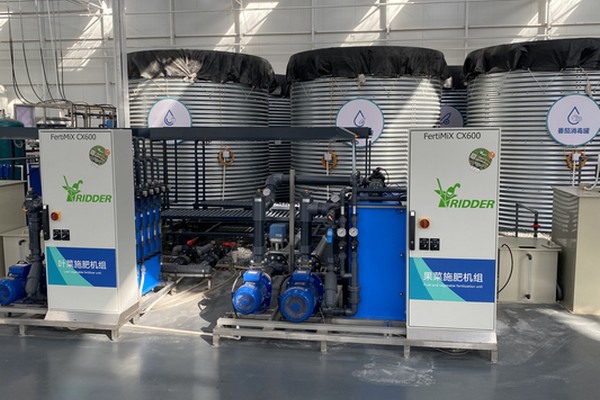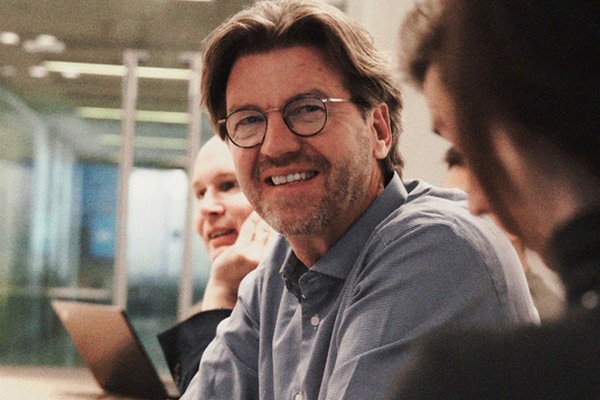Dutch horticultural companies have been increasingly exploring opportunities 'behind the Great Wall of China.' One of the suppliers focusing on the Chinese market is Ridder, where Joep van den Bosch. Van den Bosch has been appointed as General Manager of the local Ridder team since January 1, 2024. He points out China's potential: "Five to ten years ago, in China, Dutch companies often delivered large turnkey projects." That went well until the greenhouses were used by growers who weren't familiar with the large amount of technology.
However, according to Joep, current Chinese policy is changing: "The people there highly respect Dutch knowledge; moreover, they also want to build their horticultural sector, including the production of horticultural equipment." Nowadays, the challenge for Dutch companies is to turn their knowledge and expertise into something valuable.

A water unit in a Chinese greenhouse
Transition to local production
"In past years, we sold steel, glass, and aluminum. Our expertise was included in the price of the steel. That's no longer the case, as they can also manufacture the steel structure themselves. Therefore, today's greenhouse builders rather are architectural firms that design entire projects – with construction and production taking place in China."
This means that Dutch suppliers need to adjust. For example, Ridder's shade screens are now produced both in the Netherlands and in China. "We're also looking at several other products that we can produce locally. A water unit, for instance, can largely be assembled in China. Only its computer is from the Netherlands. This saves on transport."
Sometimes, local production is even an absolute must. "We increasingly see that local investors in China demand that a percentage of a project is locally produced. To be successful in China, you'll have to follow that trend."

Joep van den Bosch
Government stimulates the economy
Joep also identifies a second trend: the Chinese government is stimulating the local economy. "In their five-year plan, they've designated 'smart agriculture' as a core area. This means that horticulture receives a lot of investment. Part of it is high-tech, but also investment in tunnels and 'solar greenhouses.' Generally, you see a shift from open field to protected cultivation."
The Chinese government's concerns about high-tech horticulture are particularly directed at energy consumption. "So, we'll pay extra attention to projects involving geothermal energy, residual heat, and the like. We should more actively promote high-tech."
At the same time, over the past 10-15 years, multiple demonstration projects were realized in China. "Currently, we are experiencing a shift toward large-scale projects (10 to 20 hectares.).I expect that a total of 200-300 hectares of high-tech greenhouses will be built next year."
Joep considers this to be the starting point of large-scale high-tech. "There's a challenge there: when you start building on a large scale, there's also pressure on the returns. This raises questions about how to manage energy, production, marketing, etc. As such, there are opportunities for Dutch companies and growers' cooperatives: people are already being trained to staff these new greenhouses in China. Being able to already provide the necessary knowledge and expertise to run such a greenhouse could be an interesting business model."
Part of a 'different world'
In some respects, China is a world of its own – the internet services used there are a good example of this: Rather than using Google and WhatsApp, one must use WeChat and other local platforms. Partly thanks to the local team, Ridder is part of that 'different world.
Joep illustrates this using an example. "In January, I was in China to meet greenhouse builders and government officials. I met a Chinese mayor who conceived the plan to develop a greenhouse area of 2000 hectares in his city. They think big in China. Whether it will happen is the question, but they plan ahead. Thus, there are opportunities, provided that local production is taken into account."
As a result of these ambitious plans, launching local production suddenly becomes much more realistic and more common among Dutch suppliers." Ridder's people and branch office are present in China. In this way, we can really connect with the local market."
For more information:
Ridder 
Honderdland 131
2676 LT, Maasdijk
Tel.: 085 833 833
info@ridder.com
www.ridder.com
